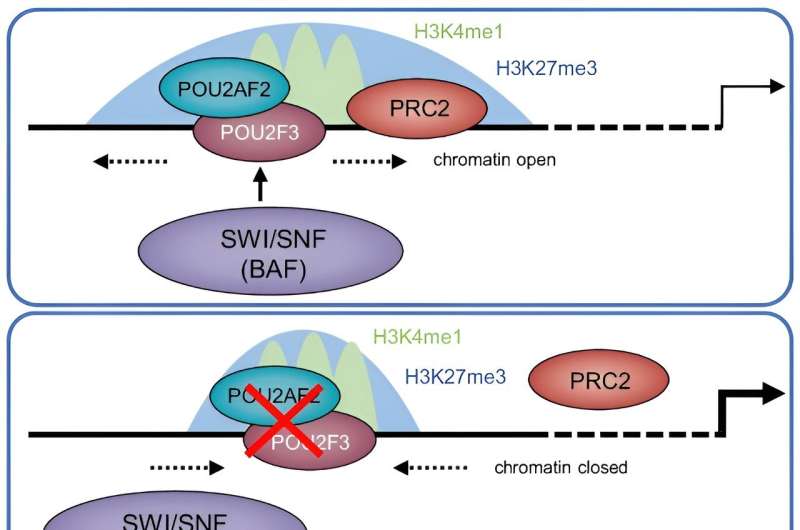This article has been reviewed according to Science X's editorial process and policies. Editors have highlighted the following attributes while ensuring the content's credibility:
fact-checked
peer-reviewed publication
trusted source
proofread
Potential therapeutic target for small cell lung cancer discovered

Northwestern Medicine investigators have discovered that inhibiting a chromatin remodeling complex associated with a particular gene in small-cell lung cancer (SCLC) cells may decrease cancer cell differentiation and tumor growth, according to findings published in Nature Communications.
The study, led by Lu Wang, Ph.D., assistant professor of Biochemistry and Molecular Genetics, and Zibo Zhao, Ph.D., assistant professor of Biochemistry and Molecular Genetics, suggests that inhibiting the complex may serve as a promising therapeutic target for SCLC, which currently has a five-year survival rate of less than 30%.
SCLC is typically diagnosed in individuals with a history of smoking, and accounts for roughly 13% of all lung cancer diagnoses, according to the American Cancer Society. In a previous study published in Science Advances, Dr. Wang's team discovered a new gene, which they named POU2AF2, and is essential for activating a specific subtype of SCLC and may serve as a biomarker for early identification of SCLC.
In the current study, Wang and his colleagues aimed to identify the precise function of POU2AF2 in cancerous tuft cells—multi-functional cells which make up the epithelial lining of different organs throughout the body, including the lungs—using various genetic sequencing approaches, as well as genome-wide CRISPR screening.
Using these approaches, the scientists discovered that POU2AF2 collaborates with an associated chromatin remodeling complex to essentially open chromatin, which contains the cancer cell's genetic material, and recruits different epigenetic factors to maintain its genetic expression.
"Basically, POU2AF2 is a pioneer. It goes in and recruits a lot of helpers, or different epigenetic factors and machinery to drive gene expression," Wang said.
Furthermore, the investigators discovered that POU2AF2 represses the expression of the PTEN gene, a well-known tumor suppressor, which further contributes to the development of SCLC.
While there are no currently available drugs that target POU2AF2, Wang said another promising approach is targeting the epigenetic factors that are recruited by POU2AF2. This approach, according to Wang, involves inhibiting the SWI/SNF complex, an essential chromatin remodeling complex utilized by all eukaryotic cells.
To validate their hypothesis, the investigators depleted POU2AF2 expression in SCLC cells using a commercially available SWI/SNF inhibitor, discovering that SWI/SNF inhibition significantly reduced SCLC tumor growth both in vitro and in vivo.
"Impeding POU2AF2-mediated transcriptional regulation represents a potential therapeutic approach for human SCLC therapy," the authors wrote.
Aileen Szczepanski and Natsumi Tsuboyama, former lab technicians in the Wang laboratory, and Huijue Lyu, a student in the Driskill Graduate Program in Life Sciences (DGP), were co-first authors of the study.
More information: Aileen Szczepanski et al, A SWI/SNF-dependent transcriptional regulation mediated by POU2AF2/C11orf53 at enhancer, Nature Communications (2024). DOI: 10.1038/s41467-024-46492-5


















